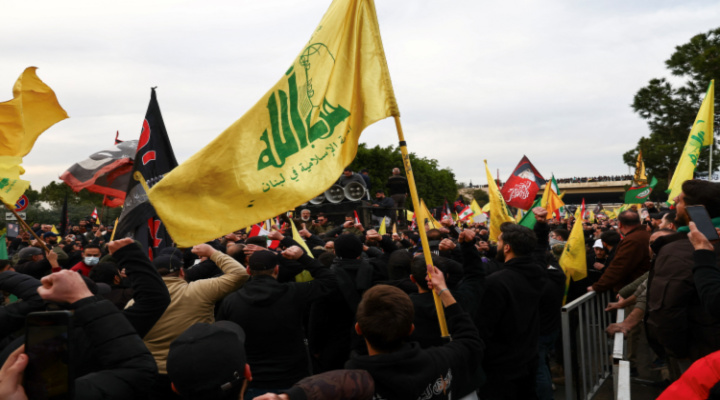Supporters of Hezbollah attend a protest organized by them against what they said was a violation of national sovereignty, near Beirut international airport, Lebanon, Feb. 15, 2025. Photo: REUTERS/Emilie Madi
If PBS and the AP had been covering World War II with today’s “journalists,” they might have used a headline like: “Survivors of Strike on SS Barracks Struggle to Rebuild Lives.”
Last week, PBS repackaged an Associated Press puff piece about Hezbollah operatives — yes, members of an openly Iranian-backed terror organization — as if they were tragic war heroes nursing shrapnel wounds and broken dreams.
The result isn’t journalism; it’s moral laundering.
Somewhere in a taxpayer-funded newsroom, far from the blast craters of Kiryat Shmona or the graves of a dozen Druze children killed by Hezbollah in Majdal Shams, editors at PBS decided this was the human drama worth telling: the plight of Hezbollah terrorists whose pagers exploded last year.
Yes, pagers. The preferred communication device of drug dealers in 1993 and, apparently, Iranian-backed death squads in 2024. Israel used these pagers in an operation against a group that has spent decades murdering Jews, destabilizing Lebanon, mass-murdering and kidnapping Americans, and stockpiling enough rockets to turn Tel Aviv into Dresden.
But in PBS’ and the AP’s telling, these weren’t members of an overtly genocidal terror organization.
No, they were “survivors” — noble men recovering from injuries and wistfully recalling better days, when all they did was try to wage a “holy war” against the world’s only Jewish state, run a narco-state (within a state) dealing drugs worldwide, help Bashar al-Assad massacre hundreds of thousands in Syria, and try to spread violent jihad worldwide.
That’s why it would be equivalent to the BBC running a story in 1944, titled, “Survivors of Strike on SS Barracks Struggle to Rebuild Lives”
The technique is the same: strip away the context, humanize the aggressor, and recast the conflict as a tragic misunderstanding between two morally equivalent sides. It’s narrative taxidermy — gut the facts, preserve the skin.
We are asked to empathize with Hezbollah in precisely the way we’d never be asked to empathize with Nazis, the Ku Klux Klan, or the IRA’s Brighton bombers. In the polite salons of Western media, some extremists get obituary-length tributes, while their victims get buried twice — once in the ground, and once in the story.
This is not simply bad journalism. It’s moral inversion.
The public is entitled to news reporting that reflects who started the war, who seeks genocide, who is openly fascist, and who seeks a worldwide totalitarian caliphate, as well as who’s defending against it. What they’re getting instead is an empathy imbalance so grotesque that it could only survive in newsrooms hermetically sealed from reality.
If the next feature is “ISIS Fighter Opens Bakery, Says Cakes Help Him Heal,” don’t be surprised. In this era of moral inversion, the terrorist will get more coverage than the victims.
Micha Danzig is a current attorney, former IDF soldier & NYPD police officer. He currently writes for numerous publications on matters related to Israel, antisemitism & Jewish identity & is the immediate past President of StandWithUs in San Diego and a national board member of Herut.
Click this link for the original source of this article.
Author: Micha Danzig
This content is courtesy of, and owned and copyrighted by, https://www.algemeiner.com and its author. This content is made available by use of the public RSS feed offered by the host site and is used for educational purposes only. If you are the author or represent the host site and would like this content removed now and in the future, please contact USSANews.com using the email address in the Contact page found in the website menu.








